|
|
|
Sort Order |
|
|
|
Items / Page
|
|
|
|
|
|
|
| Srl | Item |
| 1 |
ID:
160637
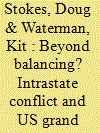

|
|
|
|
|
| Summary/Abstract |
Grand strategic theorists share an historical emphasis on interstate conflict, yet in contrast to the more frequent intrastate conflicts, these represent only 7 of the some 273 US military deployments since 1900. We argue that these intrastate conflicts limit the utility of regional balances of power in mitigating forms of conflict that the US may consider inimical to its national security interests. When considering potential changes to US force posture and grand strategy, American coercive statecraft should be theorised along a broader strategic continuum encompassing the full range of conflict.
|
|
|
|
|
|
|
|
|
|
|
|
|
|
|
|
| 2 |
ID:
079042
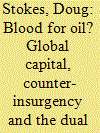

|
|
|
|
|
| Publication |
2007.
|
| Summary/Abstract |
The US-led invasion and occupation of Iraq coupled with the increased militarisation of international relations as part of the 'war on terror' has led to the development of a 'blood for oil' thesis that posits the centrality of oil and the economic interests of US oil corporations to American intervention in the Third World. This article argues that this thesis, whilst correct in identifying the importance of energy to US intervention, is not sufficiently attentive to the dual nature of American resource interventions whereby the American state seeks not only to ensure US oil supplies but also to maintain sufficient oil supplies for the global economy as a whole. American intervention is thus driven by oil to a large extent, but in different ways to those commonly suggested by 'blood for oil' theorists. In contrast to this thesis I argue that recent energy security moves to diversify oil acquisition away from the Middle East towards new areas such as South America, the Caspian region and Africa continue to be subject to this dual logic. Moreover, counter-insurgency warfare is increasingly being deployed to insulate oil-rich states from internal pressures which is in turn having a profound effect on human rights, social justice and state formation in the global South
|
|
|
|
|
|
|
|
|
|
|
|
|
|
|
|
| 3 |
ID:
129754
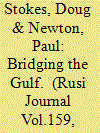

|
|
|
|
|
| Publication |
2014.
|
| Summary/Abstract |
Strategy is often about choices and those made in the 2015 Strategic Defence and Security Review will have significant implications for the future of UK defence and wider national security. The US has already made profound choices in this regard: it is rebalancing to East Asia. The implications for the UK, both as a US partner and a major European military power, include the possibility of deeper engagement with the Middle East and North Africa. Doug Stokes and Paul Newton examine the UK's nascent 'east of Suez' initiative, its key interests as well as the geopolitical drivers, dangers and opportunities involved. As the US seeks greater burden-sharing from its European allies, should the UK bridge the Gulf?
|
|
|
|
|
|
|
|
|
|
|
|
|
|
|
|
| 4 |
ID:
105719
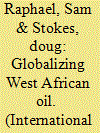

|
|
|
|
|
| Publication |
2011.
|
| Summary/Abstract |
This article examines the nature of US oil intervention in West Africa and in particular the ways in which US strategic policy is increasingly being wedded to energy security. It argues that academic debates of a 'new oil imperialism' overplays the geostrategic dimensions of US policy, which in turn underplays the forms of globalization promoted by Washington in the postwar world. Specifically, the US has long sought to 'transnationalize' economies in the developing world, rather than pursue a more mercantilist form of economic nationalism. This article argues that US oil intervention in Africa conforms to this broader picture, whereby processes of transnationalization and interstate competition are being played out against the backdrop of African oil. The recent turmoil in the Middle East and North Africa will add to these dynamics in interesting and unpredictable ways.
|
|
|
|
|
|
|
|
|
|
|
|
|
|
|
|
| 5 |
ID:
122269
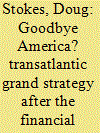

|
|
|
|
|
| Publication |
2013.
|
| Summary/Abstract |
As China rises, the popular wisdom is that the US is in inexorable relative economic decline. A rapid loss of US power would affect the national-security interests of its close allies, particularly the UK. However, Doug Stokes argues that America's decline is not as pronounced as is commonly assumed. Even after the crisis, it remains, fundamentally, economically sound and its strategic power in important parts of the world means it retains the tools to manage a potential 'hegemonic transition'. Nonetheless, the financial crisis has quickened structural shifts in transatlantic relations, which will inevitably have an impact on European strategy.
|
|
|
|
|
|
|
|
|
|
|
|
|
|
|
|
| 6 |
ID:
060629
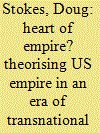

|
|
|
| 7 |
ID:
159463
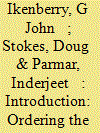

|
|
|
|
|
| Summary/Abstract |
The Trump presidency appears to personify, along with Britain's vote to withdraw from the European Union, a sense of deep crisis in the United States-led liberal international order (LIO). The two states that conceived and constructed a whole array of international institutions after 1945 now seem to be rejecting that order, or at the very least, demanding that its institutions either be reformed or recalibrated to better suit their purposes. However, both developments may signal a new phase in the evolution of the international system—more nationalistic, state-centric and transactional, in which costs and responsibilities are more widely shared and where the electorate questions the costs versus benefits of the postwar liberal consensus. This crisis has long been evident
|
|
|
|
|
|
|
|
|
|
|
|
|
|
|
|
| 8 |
ID:
167321
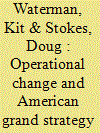

|
|
|
|
|
| Summary/Abstract |
In spite of fiscal pressure at home and China’s continued rise abroad, the United States shows no signs of reversing its costly grand strategy of deep engagement. In the context of America’s relative decline, we evaluate existing proposals to ease pressure on the United States. We argue that the key aspects of American decline are often operational rather than strategic in nature; consequently that the undifferentiated fashion in which rise and decline is often presented is not useful in describing current changes or in proposing how to address them. Problems at the operational level do not necessarily demand higher-level strategic level alterations. As such, although restructured forms of deep engagement will help alleviate resource constraints in the medium to long term, their utility in addressing the operational changes wrought by relative decline are less apparent. Given that resource constraints are not necessarily the primary concern, therefore, the major strategic elements of American deep engagement are more durable than commonly supposed. America’s current strategic objectives are not constrained by changes by virtue of its relative material decline with respect to China but by changes in the operational environment.
|
|
|
|
|
|
|
|
|
|
|
|
|
|
|
|
| 9 |
ID:
155475
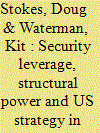

|
|
|
|
|
| Summary/Abstract |
What is the utility of US military power when seeking to generate international economic arrangements preferential to its national interests? Conventional theories of relational power, whereby actor A compels actor B against their own will, offers a narrow range of explanations. We argue that theories of structural power, whereby an actor can utilize positional advantages to shape the structural contexts of other states international preferences offers a more nuanced account of the close interaction between geopolitics and the global economy. We taxonomize structural power into positive and negative components, applying these to a case-study of regional American primacy in east Asia. We argue that US primacy has allowed it to leverage its military power into generating political–economic institutional outcomes that have reinforced its broader leadership role. The US may well continue its deep engagement or follow a path of retrenchment under President Trump, but both grand strategic options will impact on its capacity to leverage such structural power and have implications for US hegemony and the region's political economy.
|
|
|
|
|
|
|
|
|
|
|
|
|
|
|
|
| 10 |
ID:
123881
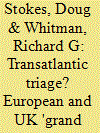

|
|
|
|
|
| Publication |
2013.
|
| Summary/Abstract |
Transition in the Middle East, the ongoing effects of the global financial crisis and the United States' rebalance to Asia are key trends that will have an impact on transatlantic relations and European defence. As US priorities shift, a common European 'grand strategy' could encourage the development of a shared vision to help Europe order its priorities and begin to respond to the new, post-austerity context of world politics and shrinking defence budgets.
Will these changes be enough to quicken Europe's currently shrivelled strategic thinking? In any scenario, given its relative weight and role as an interlocutor with the US, the United Kingdom will remain vital to any developing European security and strategy agenda, although its broader relations with the European Union will complicate this relationship. How it proceeds will also help to define the boundaries of this nascent European security order.
This article charts these key global trends, relates them to current debates in European security and strategy and maps opportunities and constraints faced by Europe and the UK in developing a grand strategy in an increasingly 'American-lite' European neighbourhood.
|
|
|
|
|
|
|
|
|
|
|
|
|
|
|
|
| 11 |
ID:
159470
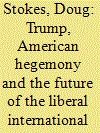

|
|
|
|
|
| Summary/Abstract |
Through its ambivalence towards its global security alliances, abrogation of free trade treaties and questioning of globalization, the Trump administration has argued that the United States-led liberal international order is too burdensome. How accurate is this portrayal? Drawing on theories of hegemonic leadership, the paper argues that the US national interest became globalized in the postwar international system and the US-led liberal order has given it enormous positional advantages. These include the capacity to shape the international preferences of other states, externalize domestic economic crises and construct the kind of international economy it wanted. Despite growing international competition, the US still has essentially the same global interests. However, neo-liberal globalization has weakened the domestic consent for American leadership among large sections of the American working class, who have rationally rejected continued US commitment to a system that has deepened economic inequality in the US. Trump has ridden the wave of this discontent, and although US elites may wish to return to the status quo after President Trump, these structural issues will remain. Trump may well do irreparable damage to the liberal order and thus, more broadly, to the West. While imperfect, the liberal order is still the ‘best of a bad bunch’ in terms of forms of systemic order on offer, and if the luxury of choice remains after Trump, a new domestic and international social contract is needed to revive US global leadership.
|
|
|
|
|
|
|
|
|
|
|
|
|
|
|
|
| 12 |
ID:
177071
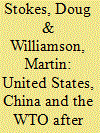

|
|
|
|
|
| Summary/Abstract |
A hegemon can destroy its international regimes, but what happens when it does not possess the capacity to reconstitute a regime to its liking? Drawing on structural power theory, our article examines President Nixon’s historic attacks on the Bretton Woods international monetary regime to help illuminate President Trump’s attacks on the World Trade Organisation (WTO). In both cases regime destruction was driven to a large extent by a desire to contain rivals: Europe for Nixon, China for Trump. Drawing on original archival material, our case study analysis shows that while the United States possessed sufficient negative structural power to derail Bretton Woods, it lacked sufficient positive structural power to create the new monetary structure Nixon wanted. Trump faces a similar dilemma: he can block the WTO regime, but cannot necessarily replace it with one to the United States’ liking. China is too powerful and possesses too much structural power of its own to give up its WTO privileges without a fight. After the Coronavirus pandemic, it is unlikely that China can prevent the United States from wrecking the WTO trade regime, but very likely it can block US attempts to create a successor regime tailored exclusively to US requirements.
|
|
|
|
|
|
|
|
|
|
|
|
|
|
|
|
| 13 |
ID:
132916
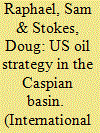

|
|
|
|
|
| Publication |
2014.
|
| Summary/Abstract |
President Obama has continued to emphasise the strategic importance of stable energy supplies to US national security interests, with the oil-rich Central Asian region a key part of global energy markets. This region has seen significant economic and strategic inroads by the United States over the last decade in a broad attempt to integrate it within the US-led liberal order. This article examines these policy developments and draws upon theoretical debates on US grand strategy to argue that, rather than necessarily signalling increasing geopolitical rivalry with other powers such as China and Russia, US policy is designed primarily to incorporate the region through deepening market interdependence. As such, while there is a complex mix of geopolitical rivalry and economic interdependence developing in the Caspian, even in the face of purported US decline and increase of its domestic supplies through fracking, Washington remains committed to acting as a hegemonic stabiliser in the Caspian.
|
|
|
|
|
|
|
|
|
|
|
|
|
|
|
|
|
|
|
|
|